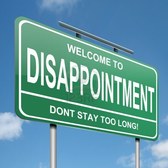“If you are distressed by anything external, the pain is not due to the thing itself, but to your estimate of it; and this you have the power to revoke at any moment.” -Marcus Aurelius

Don't worry. Part 3 of "who's keeping you stuck" is still coming. I just felt that this piece was necessary to post today.
Feeling “let down” by others (or ourselves) can be a trigger for a lot of people because disappointment feels unfair. Because disappointments are practically impossible to get away from, here are some helpful skills you can use instead of remaining gloomy or giving up…
Remove expectations
Don’t set yourself up. Many times disappointment comes from having unmet expectations. We expect things to go a certain way, or we make plans, and often our reality doesn’t match our imagined outcome. If you remove expectations from the start, you will have less chance of being disappointed! Go with flow. Life isn’t good or bad. It just is. Our fantasies about how we would like things to be only cloud our ability to live in the present moment. We miss the beauty that is happening all around us. Stop expecting and start living.
Reframe
Find the positive truth, reflect on what you can learn. If that doesn’t work, practice gratitude. Remember that when “bad” or unwanted things happen, we are the ones who choose what to focus on and how we respond. Finding a way to reframe a situation instead of impulsively reacting can build character. Practicing this skill often will make it easier to use when you need to. Our attitude often controls our view of a situation. Think about the last time you were really hungry and waiting for someone to go eat. Did the person you were waiting on take longer just because you were hungry and waiting for them? Doubtful. But you could absolutely see it that way. OR you could focus on the fact that you have someone to go eat with…that you can afford to eat when others can’t…etc. What is the worst thing that could happen if you decide to focus on the positive? (Note* A little self-awareness can come in real handy in moments like this. If you recognize that your mood is affected by your hunger, you can more easily reframe or practice gratitude.)
Accept
Radical acceptance is a skill to use in times when we are faced with situations that we CAN NOT change and that we must deal with. It is deemed “radical” because it takes quite a bit of work to accept things we don’t like. Much of life is out of our control, so getting upset (and staying upset) when things don’t go the way we’d like only adds to our feeling of discontent. If you can’t change it, accept it. Accepting does not mean that you approve; it only means that you have stopped fighting reality. This simple practice can help remove a lot of our unnecessary suffering.
Reach out for support
That’s what friends are for. A support system is a vital part to our continued growth and improvement. If you struggle using any of the above tools, reach out to a friend or professional to see if they can give you a different way to approach what you’re struggling with. People outside of the situation can often see the bigger picture and find helpful solutions we are unable to see (kind of a “forest for the trees” situation, if you will). Keep your team on deck for emotional emergencies!
Y'all know I love music, and I haven't posted a song to go with a blog in a while. Check out this beautiful ballad by Lionel Richie. You can find the lyrics HERE.
Feeling “let down” by others (or ourselves) can be a trigger for a lot of people because disappointment feels unfair. Because disappointments are practically impossible to get away from, here are some helpful skills you can use instead of remaining gloomy or giving up…
Remove expectations
Don’t set yourself up. Many times disappointment comes from having unmet expectations. We expect things to go a certain way, or we make plans, and often our reality doesn’t match our imagined outcome. If you remove expectations from the start, you will have less chance of being disappointed! Go with flow. Life isn’t good or bad. It just is. Our fantasies about how we would like things to be only cloud our ability to live in the present moment. We miss the beauty that is happening all around us. Stop expecting and start living.
Reframe
Find the positive truth, reflect on what you can learn. If that doesn’t work, practice gratitude. Remember that when “bad” or unwanted things happen, we are the ones who choose what to focus on and how we respond. Finding a way to reframe a situation instead of impulsively reacting can build character. Practicing this skill often will make it easier to use when you need to. Our attitude often controls our view of a situation. Think about the last time you were really hungry and waiting for someone to go eat. Did the person you were waiting on take longer just because you were hungry and waiting for them? Doubtful. But you could absolutely see it that way. OR you could focus on the fact that you have someone to go eat with…that you can afford to eat when others can’t…etc. What is the worst thing that could happen if you decide to focus on the positive? (Note* A little self-awareness can come in real handy in moments like this. If you recognize that your mood is affected by your hunger, you can more easily reframe or practice gratitude.)
Accept
Radical acceptance is a skill to use in times when we are faced with situations that we CAN NOT change and that we must deal with. It is deemed “radical” because it takes quite a bit of work to accept things we don’t like. Much of life is out of our control, so getting upset (and staying upset) when things don’t go the way we’d like only adds to our feeling of discontent. If you can’t change it, accept it. Accepting does not mean that you approve; it only means that you have stopped fighting reality. This simple practice can help remove a lot of our unnecessary suffering.
Reach out for support
That’s what friends are for. A support system is a vital part to our continued growth and improvement. If you struggle using any of the above tools, reach out to a friend or professional to see if they can give you a different way to approach what you’re struggling with. People outside of the situation can often see the bigger picture and find helpful solutions we are unable to see (kind of a “forest for the trees” situation, if you will). Keep your team on deck for emotional emergencies!
Y'all know I love music, and I haven't posted a song to go with a blog in a while. Check out this beautiful ballad by Lionel Richie. You can find the lyrics HERE.



 RSS Feed
RSS Feed
